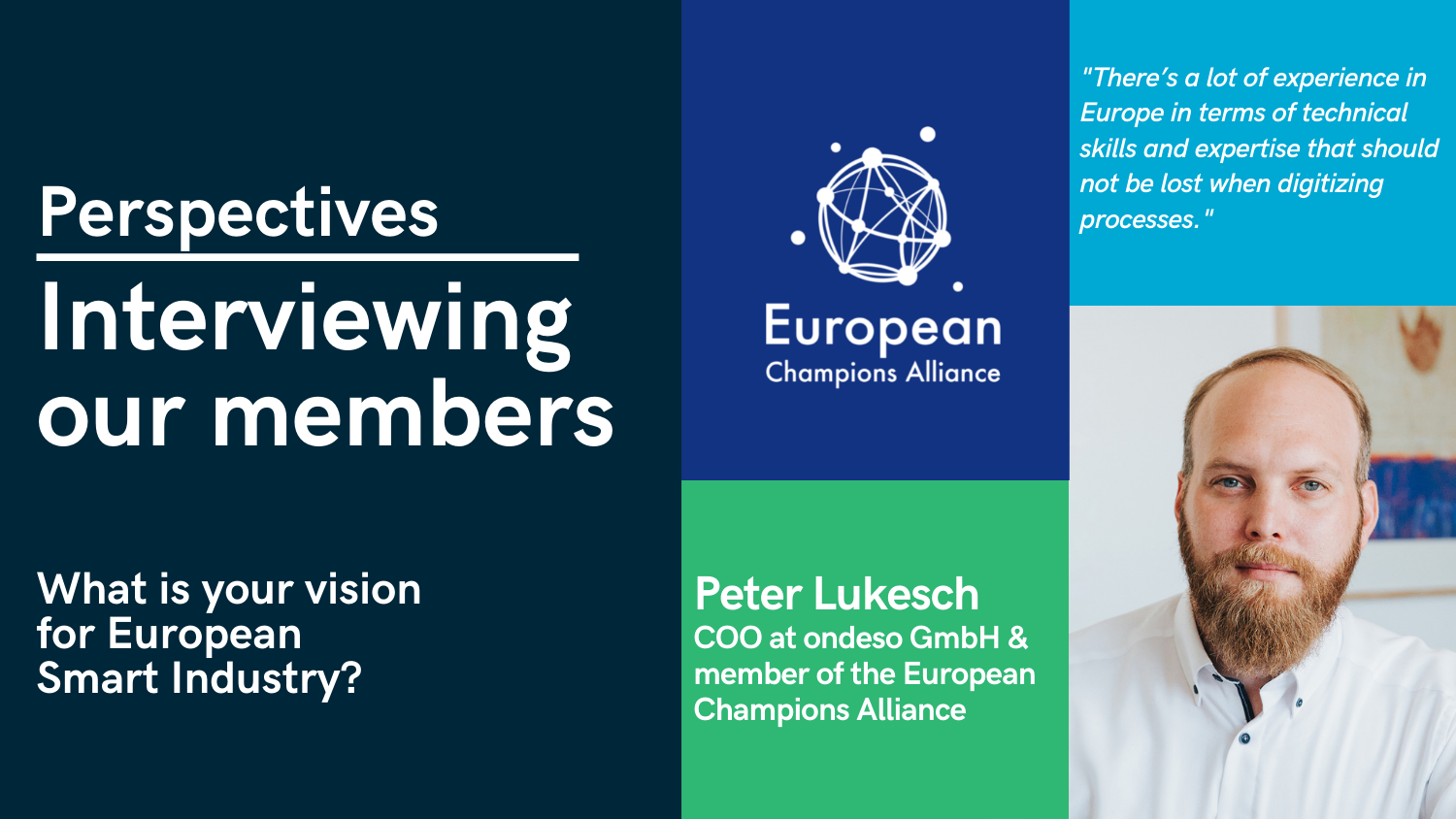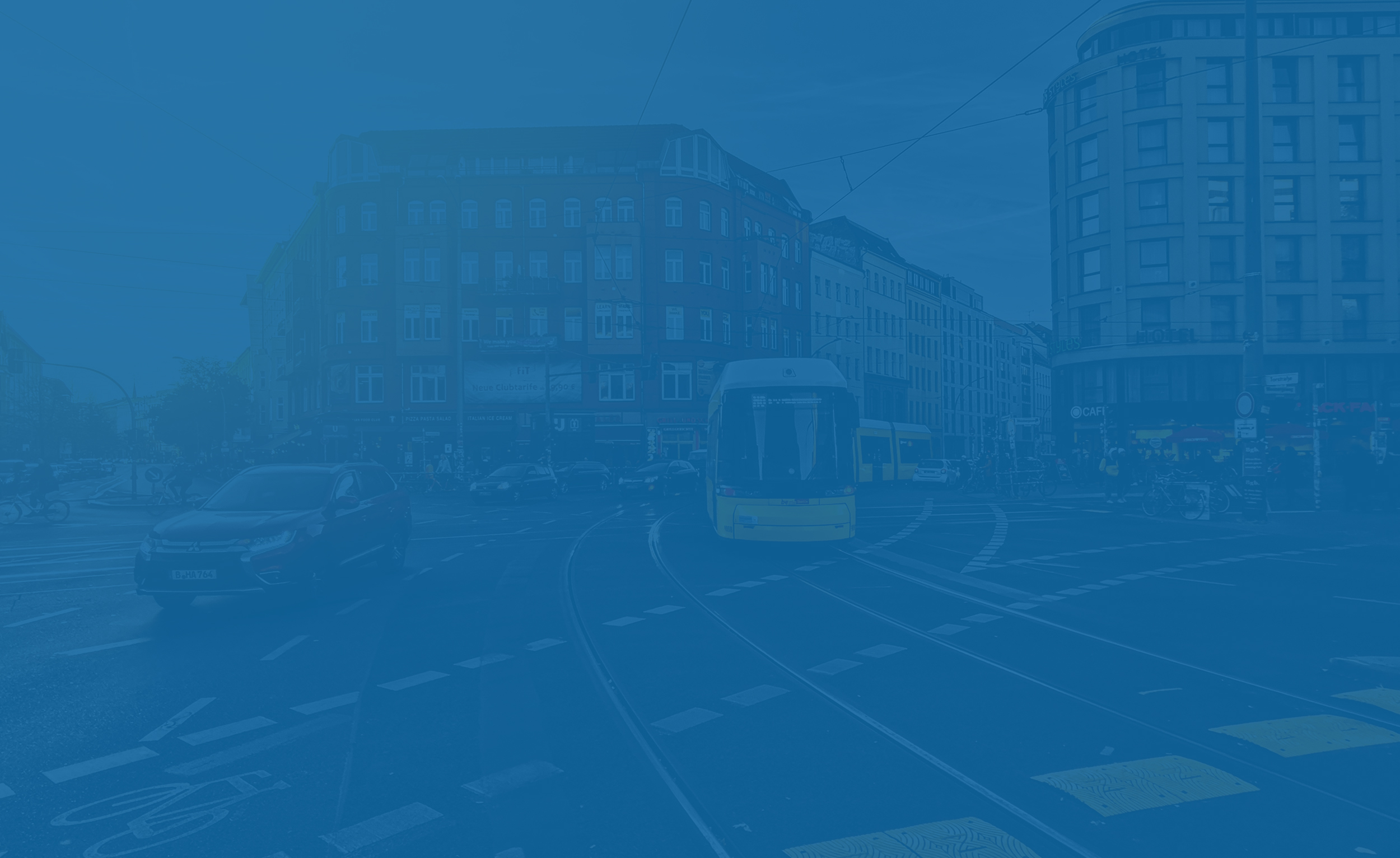
09 Aug Interview with Peter Lukesch – ondeso
Has ondeso already expanded into Europe? If yes, where? If not, why not? Is ondeso planning this step in the medium term?
In fact, we focused on German customers so far. This is due to the fact that the legal and regulatory requirements have been much easier to handle, allowing us to get up to speed. Even more important is that the main market for industry and manufacturers is in the DACH area, so why go far afield for our main customers. However, our customers have production facilities abroad, which allowed us to gain experience in handling international customers, too.
In your opinion, how can companies in Industry 4.0 best internationalize? Which criteria have to be met? How do you have to be positioned? What goals do you have to set yourself? → Especially for medium-sized companies
An important point is the interaction between manufacturer and operator. The operator requires the manufacturer’s approval and vice versa. That makes it a ping pong game for us. Hence, there’s a difficult entry point. My role and the role of my team in this is that of a mediator between both parties. Since a customer’s machine is not ondeso’s core competence, but the means to an end, the right arrangements have to be put in place. In addition, our customers usually have machines from several manufacturers, which complicates the implementation of our solution, or the ping pong game. However, there are exceptions in the chemical or pharmaceutical sector, as some of these only work with one machine manufacturer.
Additionally, I see SME financing as very difficult, especially in Germany. There, you have to prove a lot, submit a proof-of-concept, until one or the other investor decides to support the venture financially in a later round and with the required amounts for growing exponentially. This makes it even harder for German companies, which have to laboriously work their way up, customer by customer, instead of being able to use the stepping stone of financial injection from the start.
One question that arises is whether the country you are from is always the best for turning your idea into a venture? Are there other countries where the regulatory and administrative efforts are simpler but lead to the same result?
Another problem is that when a promising company is sold to a large group, the original innovation usually disappears. This fizzles out when the purchased product or service appears somewhere in a menu item of the large corporation, but no longer has any real application. According to my experience, many medium-sized companies have grown over several generations in the past. Nowadays, startups should play along with the big names after 10 years. Are these requirements fair? Is it healthy for the local economy that American investors gradually buy up innovations?
So how can we protect innovation?
You have to act independently. It is important to collect information about the customers. Above all, this includes ethical and sustainable aspects. These would have to fit the vision of the scale-up; otherwise dilutes the original identity of the company. The firm’s identity is primarily in the hands of the founders, who, especially in the initial phase, have to take the reins in hand in order to take the right course.
In addition, a scale-up must not only depend on one major customer. The product offer has to work for several customers, which allows for more independence.
Is it worth striving for European growth, together with only European customers and suppliers? What difficulties do you see here? What is it missing?
The main difficulty in working with cross border clients and suppliers is the legal framework, such as taxes and customs, but also bureaucracy and administrative tasks, as well as other aspects such as mentality, work habits and other cultural differences.
An alternative for us as ondeso is hence working with German companies abroad to build a solid starting point that relies on expertise and experience. However, there are advantages and disadvantages to that. On the one hand, German companies are very structured, organized and process-based. On the other hand, direct communication is often much easier. These structures therefore often drag out simple processes. It is therefore important to have a simple framework with room for maneuver for the direct contact person, while adhering to German standards. However, this is a very fine line.
“Business gets complicated by itself”. Therefore, a company that wants to grow in Europe has to gradually take the right path instead of wanting to run faster than one can run.
There’s a lot of experience in Europe in terms of technical skills and expertise that should not be lost when digitizing processes.
You mentioned that you already have some major customers in Germany. If, for example, Daimler uses your solution in all plants, isn’t it possible to sell digital services as well? Concretely, can’t e.g. Algodone sell digital services afterwards, as an add-on? So you could support each other, at least the companies that are in the ECA.
On the one hand, our product creates a certain value. Another product or service, on the other hand, that complements ours, creates even more. So it is important to know each others’ offerings. Especially within the European Champions Alliance, as you can recommend each other and thus support each other. This gives the recommended party a leap of faith that other competitors often have to fight for but also adds some pressure in the form of advance praise.
The difficulty is that there is not always the same contact person on the customers’ side to recommend the solutions. In concrete terms, this means that the right contact person is sometimes the product manager, sometimes the production manager, sometimes the IT manager in production, etc. The responsibilities vary.
Why is ECA a good initiative and why is it different from other organizations?
On a national basis, such as Germany, most people within the same industry already know each other. The ECA is a great association because it operates across national borders and allows us members to think outside the box. This enables us to expand our network and, if necessary, to develop new business relationships. In addition, the ECA regularly organizes events that help to distribute and expand know-how in the industry. This helps enormously, as you can cover a lot with just one membership. The ECA thus provides an overview and informs the members about new developments, technologies, innovations and upcoming events.
Why is the ECA a good way to get an initial market intelligence / feedback about the market?
The exchange with other companies from the ECA is very valuable. You get different insights and informations on the maturity level and the current hot topics of different possible customers and can value on this base where to put your priorities in the sense of addressing. Additionally you get informations and insights about running or already completed projects with their ups and downs and can learn from the network not having to make the experience on your own.
What trends do you see in the Smart Industry for the near future? 5 years? 10 years?
Everything that supports and reduces or facilitates work will be on the rise. In this time of constant change, it is important not to lose focus, but to proceed bit by bit. For example, some companies collect data without knowing what to do with it. It would be better the other way around. You first have to be sure about what you want, which will in turn allow you for an easy way of data collection and application. In addition, AI can nowadays calculate almost everything, even if you don’t know the question to your answer. So, it is important to understand the problem beforehand. The difficulty is that you often need a specialist in the end because problems are often very individual.
Specifically for ondeso this means: automating the processes and tasks that the company has been carrying out over and over again for years, step by step to success. You don’t have to compulsively change everything that already works. Stabilize, automate and optimize what works.
In which areas do you see Europe on the rise versus competitors from Asia and the U.S.? Where is Europe lagging behind?
There is a great deal of traditional knowledge and know-how in the minds of Europeans; above all in handcrafted and technical domains. It is and will remain important to preserve this knowledge and make it available to future generations. Hence, what was done manually in the past needs to be successfully digitized and improved today. The only question is “how”?
On the other hand, I see all those big American companies having no real European competition. As a European, like maready being left behind when it comes to platform and cloud issues. Like others, I am sensitive about where my data is going and who could have access to it.
Description of Peter Lukesch and ondeso
No matter whether the client is a production company or a machine manufacturer, a medium-sized business, or a corporate group – ondeso supports them specifically in the field of IT operation management and security in production. The successfully launched products are suited for all industries and applicable across the entire range of production systems and procedures. Whether management systems, HMIs or controls – ondeso manages the lifecycle of industrial PCs and offers custom-fitted products on the highest technological and conceptual level – 100% made in Germany.
As COO, Peter Lukesch is responsible for structuring and organizing the technically oriented service areas at ondeso. He built up and managed the department Professional Services from 2013 to 2016. Besides his experience as Head of IT in the manufacturing industry and the medical sector, he was responsible for the planning and implementation of IT security in highly sensitive areas for a long time.
If you are interested in finding out more about ondeso visit the website or follow the social media.


